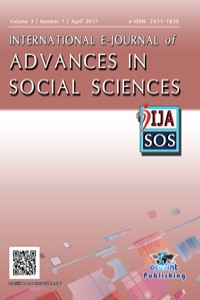Abstract
We present a comprehensive analysis of the concept of
cultural heritage and the institutionalisation of its protection by the
international law in various historical contexts of involved states, i.e.,
during peace, conflict, social and/or political crisis. Furthermore, we discuss
the human dimension of the protection of cultural heritage at an international
level under the public international law. In particular, we first investigate
whether states remain central actors at national and international level as far
as the protection of cultural property within their territory is concerned.
Subsequently, we examine the limitations imposed on the action range of a state
due to primary and secondary legislation of international organizations where
the state participates. Apart from this form of external pressure on the state
jurisdiction, we also examine whether the action range of a state is further
limited by the action of individuals and groups. Furthermore, we discuss on the
potential role of international human rights law in such situations, the
interdependence between the protection of individuals and cultural goods as
well as whether the individual is transformed into an active actor of
international law.
Our analysis clearly suggests that international
organizations play a catalytic role in cultural protection at an international
level, with UNESCO holding a leading position. UNESCO forms a central
processing mechanism for international protection standards and seems to be the
main forum for monitoring compliance of states with international protection
standards. However, an issue that certainly deserves further investigation is
whether UNESCO can be actually efficient in the absence of ratification
mechanisms regarding cultural protection.
Our approach and methodology involves thorough
analysis of concepts, review of historical developments in international law
regarding the protection of cultural heritage, review of the activities of
international organizations as well as the description of the existing legal
framework. Results of our study suggest that the issue of cultural heritage protection
is multidimensional and involves not only states but also individuals who are
holders of rights and obligations regarding cultural heritage protection. In
addition, our results clearly imply that there is still room for improvement in
the continuously evolving international law towards the establishment of a more
satisfactory framework for the protection of cultural heritage.
References
- Bassiouni, C. Reflections on Criminal Jurisdiction in International Protection of Cultural Property. Accessible to: http://surface.syr.edu/cgi/viewcontent.cgi?article=1148&context=jilc Last retreived: 09/2015. Beiraghi, M. (2012). Risk Preparedness and heritage management in times of sociopolitical crisis: The role of experts in Simon Lambert and Cynthia Rockwell, Protecting Cultural Heritage in Times of Conflict, ICCROM, Rome. Carman, J. (2002). Archaeology & Heritage. Continum, New York. Forrest, C. (2002) "A New International Regime for the Protection of Underwater Cultural Heritage", International and Comparative Law Quarterly, Vol. 51, No. 3. Accessible to: http://www.austlii.edu.au/au/journals/UQLRS/2002/2.html. Last retrieved: 11/2015. Harrison, R. What is heritage? Accessible to: https://www.academia.edu/776638/What_is_Heritage. Last retrieved: 08/2015. Jacquard, A. (2006). Quelle UNESCO pour l'avenir, UNESCO. Accessible to: http://unesdoc.unesco.org/images/0014/001455/145580f.pdf. Last retrieved: 12/2015. Merryman, J. H. Two ways of Thinking about Cultural Property. Accessible to: http://minervapartners.typepad.com/readings/MerrymanTWOways.pdf. Last retrieved: 09/2015. Pilloud, C., Sandoz, Y., Zimmermann, B. (1987). Commentary on the Additional Protocols of 8 June 1977 to the Geneva Conventions of 12 August 1949. ICRC, Martinus Nijhoff Publishers. Pressovyre, L. The past is not just made of stone. Accessible to: https://www.questia.com/magazine/1G1-77035063/the-past-is-not-just-made-of-stone . Last retrieved: 09/2015. Raftopoulos, E., McConnell, M. (2014). Contributions to International Environmental Negotiation in the Mediterranean Context, edit. Law Library, Athens. Seršić, M. (1996). “Protection of Cultural Property in Time of Armed Conflict“, Netherlands Yearbook of International Law, vol. 27. Strati, A. (1995). The Protection of the Underwater Cultural Heritage: An Emerging Objective of the Contemporary Law of the Sea, edit. Martinus Nijhoff Publishers, The Hague/London/Boston.
Abstract
References
- Bassiouni, C. Reflections on Criminal Jurisdiction in International Protection of Cultural Property. Accessible to: http://surface.syr.edu/cgi/viewcontent.cgi?article=1148&context=jilc Last retreived: 09/2015. Beiraghi, M. (2012). Risk Preparedness and heritage management in times of sociopolitical crisis: The role of experts in Simon Lambert and Cynthia Rockwell, Protecting Cultural Heritage in Times of Conflict, ICCROM, Rome. Carman, J. (2002). Archaeology & Heritage. Continum, New York. Forrest, C. (2002) "A New International Regime for the Protection of Underwater Cultural Heritage", International and Comparative Law Quarterly, Vol. 51, No. 3. Accessible to: http://www.austlii.edu.au/au/journals/UQLRS/2002/2.html. Last retrieved: 11/2015. Harrison, R. What is heritage? Accessible to: https://www.academia.edu/776638/What_is_Heritage. Last retrieved: 08/2015. Jacquard, A. (2006). Quelle UNESCO pour l'avenir, UNESCO. Accessible to: http://unesdoc.unesco.org/images/0014/001455/145580f.pdf. Last retrieved: 12/2015. Merryman, J. H. Two ways of Thinking about Cultural Property. Accessible to: http://minervapartners.typepad.com/readings/MerrymanTWOways.pdf. Last retrieved: 09/2015. Pilloud, C., Sandoz, Y., Zimmermann, B. (1987). Commentary on the Additional Protocols of 8 June 1977 to the Geneva Conventions of 12 August 1949. ICRC, Martinus Nijhoff Publishers. Pressovyre, L. The past is not just made of stone. Accessible to: https://www.questia.com/magazine/1G1-77035063/the-past-is-not-just-made-of-stone . Last retrieved: 09/2015. Raftopoulos, E., McConnell, M. (2014). Contributions to International Environmental Negotiation in the Mediterranean Context, edit. Law Library, Athens. Seršić, M. (1996). “Protection of Cultural Property in Time of Armed Conflict“, Netherlands Yearbook of International Law, vol. 27. Strati, A. (1995). The Protection of the Underwater Cultural Heritage: An Emerging Objective of the Contemporary Law of the Sea, edit. Martinus Nijhoff Publishers, The Hague/London/Boston.
Details
| Journal Section | Articles |
|---|---|
| Authors | |
| Publication Date | April 30, 2017 |
| Submission Date | April 28, 2017 |
| Published in Issue | Year 2017 Volume: 3 Issue: 7 |
Cited By
A QUALITATIVE RESEARCH TOWARDS INVESTIGATING THE SECURITY LEVELS OF ARCHAEOLOGICAL SITES: THE CASE OF AYDIN PROVINCE
International Journal of Contemporary Tourism Research
Cihat BİLGİN
https://doi.org/10.30625/ijctr.723292
KÜLTÜREL MİRASIN KORUNMASININ İNSAN HAKLARI HUKUKU İLE İLİŞKİSİ VE KÜLTÜREL MİRAS HAKKI
Dokuz Eylül Üniversitesi Hukuk Fakültesi Dergisi
Özge ÇELİKTAŞ TÜRKBAY
https://doi.org/10.33717/deuhfd.998243
Contact: ijasosjournal@hotmail.com
The IJASOS Journal's site and its metadata are licensed under CC BY
Published and Sponsored by OCERINT International © 2015- 2025

